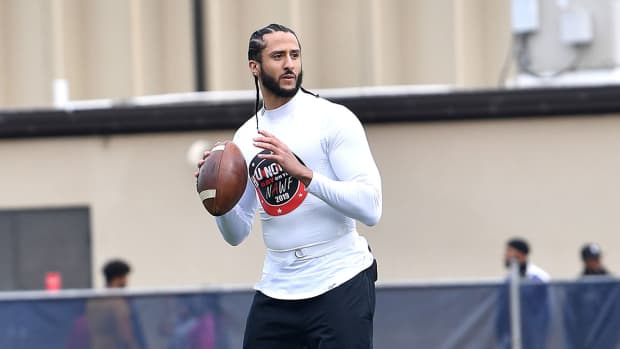Kaepernick Publishing and LEVEL, a Medium publication, today launched “Abolition For the People: The Movement For A Future Without Policing & Prisons,” a project that “seeks to introduce abolitionist values, practices, histories, and ambitions to an audience that is looking for a path to a better and more just society.”
Colin Kaepernick envisioned and curated this month-long collection of 30 essays, in the wake of the killings of George Floyd and Breonna Taylor, which he writes in his introduction to the collection, “forced our nation to grapple with not only the devastation of police terrorism, but also the institutions that constitute, enhance, and expand the carceral state.”
In this moment of increased attention over anti-Black terrorism, ABOLITION FOR THE PEOPLE, a collaboration of @KaepernickPub & @Medium, builds on centuries-long work demanding a future without policing & prisons.
Abolition now. #AbolitionForThePeoplehttps://t.co/jccRsxqLhT
— Colin Kaepernick (@Kaepernick7) October 6, 2020
Written by political prisoners, family members of those impacted by police terrorism and incarceration, organizers, movement leaders, and scholars, the pieces will be published over the next four weeks.
The package launches with the genesis and histories of the institutions and practices of police, policing, prisons, and carcerality. The necessary ahistorical context these pieces provide will be followed by perspectives on why reform is not a viable solution to the carceral state, and conclude with solution-oriented ideas on how abolition can be accomplished now and what an abolitionist future could look like.
Colin gathered respected leaders on abolition to build and support his stance on a society without police,” says Jermaine Hall, Director, Medium Editorial Group. “He delivered a comprehensive body of work to amplify a national conversation.
In June, Medium announced that Kaepernick joined the organization’s Board of Directors and was partnering with Kaepernick Publishing to create feature content focused on Black Freedom in the United States. “Abolition for the People” is the first collaboration.
More about “Abolition For the People: The Movement For A Future Without Policing & Prisons”
The package will be introduced on October 6th with two pieces: one from Colin Kaepernick sharing personal anecdotes and political analysis and the other from Dr. Angela Davis, who will introduce a framework for abolition.
In addition to week one’ two introductory pieces, readers will learn about the historical and contemporary intent and purpose of policing, and the destructive, dehumanizing, terroristic, and oppressive effects it has on communities.
Contributors to this section will be Mama Gwendolyn Woods, Kiese Laymon, Dr. Simone Brown, Dr. Mark Anthony Neal, Dr. Stuart Schrader, Talilia Lewis, Kimberlé Crenshaw, and Dr. Kihana Ross.
The second week of the package will include essays on the history of race, prisons, and the practice of carcerality in the U.S context.
Contributors to this section will be Morning Star Gali, Dr. Ameer Loggins, Dr. Jody D. Armour, Cristina Jimenez, Cynthia Garcia, Dean Spade, Kenyon Farrow, Russell Maroon Shoatz Jr., and Russell Maroon Shoatz III.
The framework and histories in the initial two weeks of the package will lay a foundation for readers in the third week, which will delve into the internal mechanics of reform and why it not only has failed to address the concerns of marginalized communities but has further naturalized and legitimized policing and prisons as a commonsensical and unproblematic solution.
Contributors to this section will be: Derrick Hamilton, Dr. Naomi Murakawa, Bree Newsome, Dr. Ruha Benjamin, Dr. Dylan Rodriguez, and Derecka Purnell.
The series will culminate in the fourth week with pieces that lay out a vision of what abolition is, what it seeks to accomplish, how it will be accomplished, and that an abolitionist future is the only way toward the liberation of humanity.
Contributors to this section will be: Mumia Abu-Jamal, Dr. Robin D.G. Kelley, Marlon Peterson, Rukia Lumumba, Dan Berger, David Stein, Frieda Afary, Lara Al-Kateb, Andrea J. Ritchie, and Mariame Kaba.



